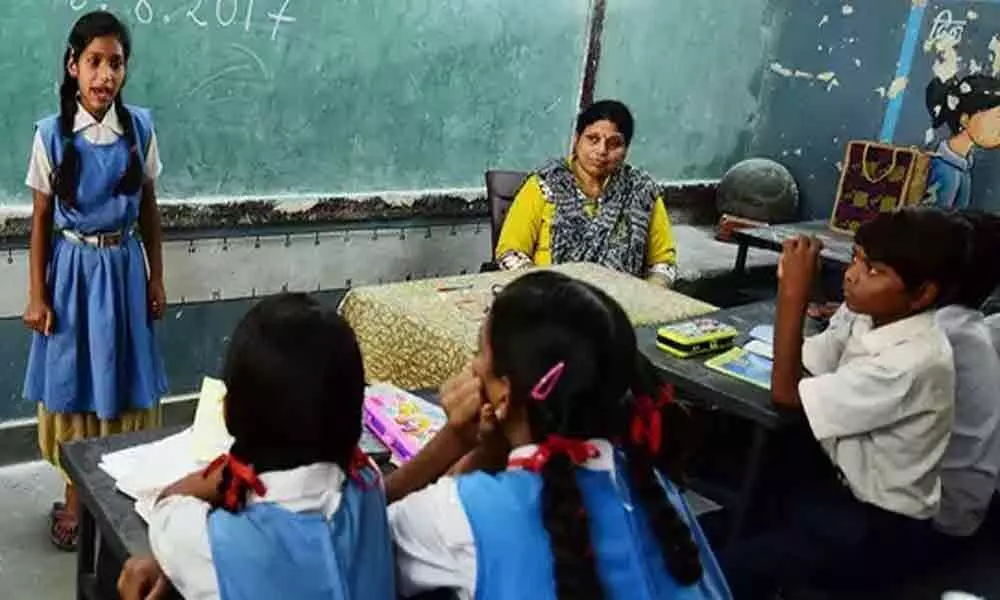Live
- No permission needed for buildings up to 15 metres
- Do you support caste census? Which one will you prefer caste census or skill census?
- GHMC Commissioner attends Prajavani, receives 126 applications
- 6 injured as lift crashes in Bahadurpura apartment
- CM Revanth: Delhi visits are in TG’s interests, scotches buzz on cabinet expansion
- Chandrababu Naidu Wishes People on Constitution Day
- World Heritage Week celebrations conclude
- Coronation of Vishvaraj as Mewar’s 77th successor starts amid questions over palace visit
- Give utmost priority to research: SKLTHU V-C
- IT Min launches ‘Transforming 10,000 Minds’ prog
Just In
Education should be democratised, available in plenty and at low cost


Education should be democratised, be available in plenty and at a very low cost, a leading Indian educationist has said, underscoring that knowledge should reach all sections of society.
Education should be democratised, be available in plenty and at a very low cost, a leading Indian educationist has said, underscoring that knowledge should reach all sections of society. Ajeenkya D Y Patil, Chairman of the Ajeenkya D Y Patil Group (ADYPG), emphasised that parents, not just in India but in other countries as well, put their life's earnings into their child's education and future. "This should not be the case," he said. Education, Patil said, should become affordable for all.
"I feel education should be democratised. It should be available in plenty and at a very low cost. Education is knowledge and knowledge should be allowed to go everywhere," he told PTI in a telephonic interview. ADYPG is primarily focussed on the education, healthcare, agriculture and sports sectors. Among the largest education providers in India, the Group has five universities in Maharashtra and over 220 institutes of higher learning, including medical, dental, engineering, hotel management institutes as well as schools across the globe.
Patil said technology has enhanced access to education tremendously and it is through technology that education is now reaching regions and sections of society that were inaccessible earlier. Against the backdrop of technological advancements, Patil said, "education will have to evolve and it is already changing because of technology.
The corporates and industry will need to come around in terms of recruitment". Patil said as technology revolutionises the education scenario, legislation will also be very important because while traditional educators have followed the laws, technology platforms will need authenticity. There will have to be some legislative changes because it must be ensured that there is quality-based education. Further, some sort of accreditation is also required to give authenticity to the new forms of education platforms that technology brings, he said.
In the next 10 years, the Group, which has a school in Belgium, is looking to expand its education footprints in the European region.
It has a medical school in the Caribbean that will go online this year. Patil described the Caribbean as an "exciting market" for the Group, which is looking to expand in the area of healthcare facilities in the region.
"Indian education has always been excellent in terms of the strong foundation and base it gives a person...Rather than bringing overseas education into India, we feel that there is an opportunity for our education to reach out (to other countries) as well," he said. "There is a lot of wisdom in the Indian teachings and that wisdom can be translated into today's realities and methodology. That will be a fantastic culmination of education," Patil added. He stressed that education and healthcare should be given more priority in the country and while the government has initiated several programmes in this regard and giving it an impetus, "there has to be a very large push in momentum" to enhance the pace.
"India has huge opportunities. It's not just about creating employment, it's about creating entrepreneurs, who can then fuel the economy by creating his businesses, employing more people. The culture of entrepreneurship is very important," Patil said. In healthcare, the Group has three hospitals in Mumbai, Pune and Kolhapur and is also now embarking on a 600-bed hospital project in Mumbai.
The Group's hospitals treat about 4,000 patients free of cost daily. Patil noted that the doctor-population ratio in India is "dismal at the moment" and there is need for many more medics to cater to patients in rural areas. With most of the doctors concentrated in the urban areas, reaching the masses in rural areas is a "big challenge" both for the government as well as for the private players.
However, the current regime is giving a "tremendous push" to bridge this gap "because they understand that there is a lack of adequacy", he said.

© 2024 Hyderabad Media House Limited/The Hans India. All rights reserved. Powered by hocalwire.com






